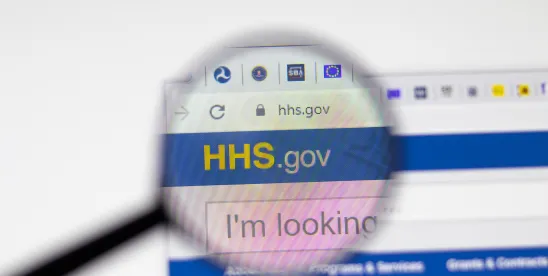Highlights
- The HHS-OIG released a favorable opinion regarding rare-disease patient assistance programs that receive funding from pharmaceutical manufacturers
- The agency determined that appropriate safeguards limit the risk under the Anti-Kickback Statute
- It is important to note that the HHS-OIG analyzed the arrangement under the current Medicare Part D cost-sharing structure (prior to new 2025 out-of-pocket caps), and limited the effective dates of the opinion until Jan. 1, 2027)
On April 8, the U.S. Department of Health and Human Services’ Office of Inspector General (HHS-OIG) released Advisory Opinion No. 24-02, a favorable opinion regarding patient assistance programs (PAPs) independently managed by a 501(c)(3) non-profit, but funded primarily by pharmaceutical manufacturers. The opinion is time-limited and only in effect until Jan. 1, 2027, to account for future legal changes which could affect the opinion’s analysis.
Eligibility for PAPs financial assistance is determined by certification from the patient’s physician that the patient suffers from a qualifying disease, and a showing of financial need based on review of the patient’s income, assets, dependents, and other financial circumstances. The HHS-OIG determined that the financial assistance offered through PAPs constitutes remuneration that implicates the Anti-Kickback Statute (AKS), but it did not impose administrative sanctions. The HHS-OIG also concluded that the arrangement did not implicate the civil monetary penalty against beneficiary inducements, as it would not induce a beneficiary to select a particular provider, practitioner, or supplier of items or services reimbursable by federal healthcare programs.
Despite the fact that the PAPs implicated the AKS, the agency concluded that the nonprofit had put sufficient safeguards in place to ensure that it maintained independence and could not steer beneficiaries to receive goods or services from the pharmaceutical company donors. As a result, the HHS-OIG said it would not impose sanctions.
Key Safeguards for Patient Assistance Programs
The proposed arrangements included individual funds for 12 different diseases, each offering up to four categories of assistance: 1) cost-sharing subsidies, 2) medical assistance, 3) premium assistance, and 4) emergency relief. Cost-sharing subsidies provided cash payments to cover some or all of the cost of items or services associated with treating the particular diseases, including, but not limited to, prescription drugs. Medical assistance payments covered a wide variety of medically necessary items and services including medical consults, office visits, infusion services, durable medical equipment, and prescription drugs. Premium assistance helped patients pay for insurance premiums required by private and federal insurance programs such as Medicare advantage or Part D plans. The emergency relief payments provided limited, short-term financial assistance for costs associated with essential, non-medical expenses that arose suddenly or in an emergency, such as utility costs, automobile repairs, or housing payments.
The HHS-OIG noted that with the requisite intent all of these payments could constitute improper remuneration under the AKS, but cited the following safeguards as limiting the possibility for fraud and abuse under these programs:
- The funds were defined based on established disease states
- The funds awarded assistance without regard to the treatment regimen prescribed for a particular patient
- The funds were open to all individuals regardless of insurance
- The funds placed limitations on sharing information with donors and beneficiaries
- The funds required an application showing financial eligibility
- The funds used more than two-thirds of the donations to pay for goods and services other than drugs manufactured by donors
It is important to note that the HHS-OIG analyzed the arrangement under the current Medicare Part D cost-sharing structure and limited the effect dates of the opinion for two years (from the publishing date until Jan. 1, 2027). With new out-of-pocket caps for Part D drugs beginning in 2025, the HHS-OIG decided to limit the opinion’s applicability due to possible new risks under the new Medicare Part D cost-sharing laws with respect to patient assistance programs.
Key Takeaways
This advisory opinion serves as a reminder that patient assistance programs can be funded by large pharma companies in the healthcare space, increasing access to critical medical care for those in need while still complying with federal healthcare laws – as long as safeguards are in place. PAP managers can effectively shield themselves from AKS liability by clearly defining eligibility requirements, awarding assistance without regard to the applicant’s insurance or proposed treatment regimen, limiting the information shared with donors and beneficiaries, and providing an adequate variety of financial assistance.
Implementing these safeguards will provide significant protection against AKS allegations while allowing nonprofits to help some of the most at-risk patients.





 />i
/>i

